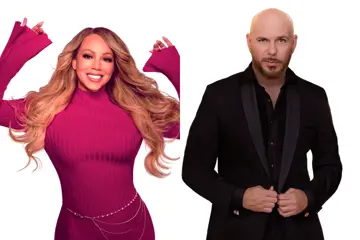 Missy Higgins
Missy HigginsHow does a female Australian singer-songwriter who just turned 41 in August make a raw confessional album with little mainstream radio and streaming appeal and still get a No. 1 debut?
She went on the road and sold 115,000 tickets in 12 months. She also creates interesting chart statistics.
Of course, no one had forgotten Missy Higgins. Close to a million people tuned in to the September 2 screening of ABC TV’s Australian Story.
Last Saturday (September 14), 15,000 people gave her an ecstatic response at triple j’s One Night Stand in Warrnambool, Victoria, on Peek Whurrong Land. She made an unexpected appearance during G-Flip’s headliner set to perform her debut hit, Scar.
Social media went into overdrive: “So healing”…”Literally, so good” …”epic” …”iconic” were some responses. “I never knew I needed this collab”, one audience member posted, while another insisted, “I need a whole album.”
The Special Two
Setting up The Second Act is a blueprint for any Australian female artist who dares to be aged over 40.
There is no mainstream radio. The ones that target the female 40—50 demographic predominantly play overseas acts. Streaming services will only include their tracks on lesser-known playlists.
For Higgins, the answer was to go the way she broke her debut album, The Sound Of White from 2004.
Go on the road and introduce herself face-to-face to a generation of high school and college students who strongly relate to its themes of hopes and dreams of what life should be. After her set, she’d hit the merchandise table and speak to these people. They learned to matter to each other.
The Sound Of White was, after all, never supposed to see the light of day. Then in her teens, Higgins wrote affirmative, highly personal songs in her bedroom. But her elder sister Nicola sent those songs to triple j behind her back, she was Unearthed, and her career launched.
Recalling that debut album, Higgins recently told ABC Radio, “I did feel intense about everything back then. When you’re that age, you’re experiencing things, some for the very first time.
“Like love and heartbreak, and you’re on the cusp of adulthood, there’s a lot of expectations, you’re just about to dive off the diving board.”
She became uncomfortable with the public scrutiny she received from such revelations, and on later albums, she moved to writing in the third person.
As her mother Margaret Higgins explained on Australian Story, “It's like having a diary except that in Missy's case, everybody gets to read it.”
Confessional
But 18 months ago, when new songs swept out of her, she noticed they had become personal and confessional again.
The starting point was the breakdown of her marriage to playwright Dan Lee, whom she met at a Broome wedding in 2013, and being a mother to Samuel, 8, and Luna, 6.
Significantly, when they got married on a farm in March 2016, the song she chose to walk down the aisle was Colin Hay’s Waiting For My Real Life To Begin. Like her fans, she had expected marriage to be a transforming milestone.
“I realised I’d gone back to that confessional mode of songwriting. I guess it’s been my way of dealing with the end of my marriage. So, I feel like I’ve come full circle …”
The Second Act is not a classic angry breakup album. It’s more of a “putting the pieces back together” record. It was made at home, with bare production, pushing the lyrics and singing out front to tell the story.
I think I’m ready for whatever comes next
How long can I scold myself for flunking the biggest test
I think I’m ready for the turning of the wheel
Find fresh waters for these old wounds to heal.
She deliberately scheduled the release of The Second Act to coincide with the 20th anniversary of The Sound Of White. It was appropriate, Higgins said. “They are book ends.” Some would call it a sequel.
With that, she embarked on a 40-date national tour that mostly consisted of theatres.
Given the spiritual kinship between the first and latest records, they had to be linked with a two-act theatre show. The first set introduced her to a couple of newies and rarities. The second set was The Sound Of White in its entirety.
The tour, her biggest headliners since 2005, sold out instantly. Half went in the first day, some in minutes. There was a five-night run at the Palais Theatre in Melbourne. Altogether, the first run moved 80,000 tickets.
“Lots of the same people I met way back then came to one of this year’s gigs – some of them even brought their kids – so this tour brought things full circle in all sorts of ways.”
It wasn’t over. Six encore shows in November and December will sell another 35,000 tickets, bringing the total to 115,000 this year.
The raw, vulnerable lyrics on The Second Act weren’t just about marriage breakups. Higgins’ original audiences had also gone through similar life changes and disappointments, whether it was new careers, kids, or coping with the deaths of family members and friends.
The shows were highly charged with much crying in the audience. During intermission, crowds wandering out into the lobby could pre-order The Second Act, still six months away.
Close to two-thirds of those pre-orders helped the new album reach No. 1 last Friday.
In the meantime, The Sound Of White re-entered the Top 10 because of the tour and returned after Australian Story.
ARIA Chart Milestones
Also keeping the spotlight on will be 9-times ARIA winner Higgins’ induction into the ARIA Hall of Fame as part of its November 20 awards in Sydney for Nine Network/YouTube broadcast.
It celebrates a remarkable career over two decades during which Higgins continued to inspire generations of female performers with how she used her early success to refuse to pander to women performer stereotypes.
It comes in a year when a local female artist can fight the odds against the music industry's thinking and still find major success.
The Hall of Fame induction puts her in the same room as Olivia Newton-John (2002), Renée Geyer (2005), Marcia Hines (2007), Kylie Minogue (2011) and Kasey Chambers (2018).
The Second Act has become the 42nd No. 1 album by an Australian female solo artist on the chart. According to ARIA CEO Annabelle Herd, Higgins “becomes only the seventh Australian artist in history to have #1 albums in at least three consecutive decades.”
The Second Act marks Higgins’ 11th week in total at No. 1 on the ARIA chart. The Sound Of White spent seven non-consecutive weeks at the top. On A Clear Night (2007) stayed for a week, and The Ol’ Razzle Dazzle (2012) for two.
Meantime, Oz (2014), Solastalgia (2018) and Total Control (2022) peaked at No. 3. The compilation The Special Ones reached No. 7 in 2018.
In terms of length of time on top of the ARIA chart by Aussie solo females, Delta Goodrem has a comfortable lead with 57 weeks.
Most of that was from her debut album, Innocent Eyes 2003/4, which spent an extraordinary non-consecutive 53 weeks. By last year, it had sold 1.2 million in Australia and 4.5 million worldwide.
Higgins is slightly ahead of both Minogue and Chambers.
Minogue has nine weeks across seven album releases, and Chambers’ tally is eight weeks over five releases.
Although Newton-John, Geyer, and Hines began their charting careers in the early ‘70s, they are not on the same page regarding aggregated weeks at the top.
ARIA introduced its charts in June 1988. Until then, the music industry relied on national charts by David Kent’s Kent Report and those by Go-Set and Juke Magazines.
Hines sold a million records and was the first Australian female performer to attain a platinum record. She had a series of massive hit singles. But she never had a No. 1 album. The highest was No. 2 with a Greatest Hits set in January 1982 and No. 3 with Shining in November 1976.
Geyer also had a run of singles but never a Top 10 album. The closest she got was No. 11 with 1977’s Moving Along and 2003’s Tenderland.
Before the ARIA charts, Newton-John peaked with Greatest Hits Vol. 2 (1982) for two weeks. She had a huge run of hit singles, but their No. 1 parent albums Grease (1978) and Xanadu (1980) were film soundtracks that were not released under her name.







